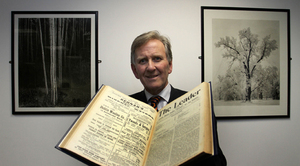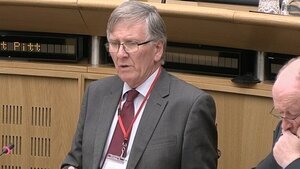Professor Colum Kenny, from Dublin City University, and member of the Broadcasting Authority of Ireland
Last week Seamus Dooley, from the National Union of Journalists, criticised the ruling by the Broadcasting Authority of Ireland concerning an item on same-sex marriage on the Derek Mooney show on RTÉ Radio One, which was broadcast in January.
A listener who complained said the programme breached the guidelines for fairness and objectivity. The BAI upheld this.
In response, Mr Dooley criticised the ruling, saying:
The BAI would appear to be singling out discussion on so called same-sex marriage, imposing restrictive conditions even before the government has provided wording on a possible referendum on civil marriage equality, never mind setting the date. Every interviewee likely to expression an opinion in favour of civil marriage equality must automatically be confronted with the alternative viewpoint. Likewise, a guest likely to oppose civil marriage equality cannot be interviewed without an advocate of civil marriage equality.
He also said, because the proposed gay marriage referendum came about because of the Constitutional Convention, journalists will now have to apply the same rule to any subject that was discussed at the convention and gave rise to a future referendum.
Further to this, Dublin City University Professor Colum Kenny, who is a member of the BAI, wrote to the National Union of Journalists challenging Mr Dooley’s criticism.
From his statement to the NUJ, Mr Kenny said:
The NUJ thinks that “the requirement of fairness, objectivity and balance has now been interpreted to mean that broadcasters are required to seek out alternative views in a range of programme settings.”
In fact, assuming that alternative views are voiced, any member of the NUJ involved
in broadcasting should know that this has been required ever since RTE was founded
more than half a century ago. Guidelines that RTE and other broadcasters issue to
their employees have long cited that law (most recently enshrined in S.39 of the
Broadcasting Act 2009). The legal requirement has never been confined to referendum campaigns.…
The NUJ is wrong to imply that the Mooney show discussed same-sex marriage in a manner somehow removed from the fact of a planned referendum. The programme participants did not seem to share the NUJ’s degree of uncertainty about the planned poll or about its central question, and had a view on how people ought to vote. Mr Mooney himself expressed his opinion in the matter.
The NUJ does not refer to another recent BCC decision concerning also the Mooney Show’s treatment of matters relevant to what the NUJ oddly terms “so called same-sex marriage”. In its earlier decision the BCC rejected a complaint by Catholic Democrats. I recommend that people read these two decisions online at bai.ie.
When rejecting the earlier complaint in June, the BCC found that that particular Mooney Show consisted largely of a factual discussion of Civil Partnership as it related to same-sex couples.
Regarding pungeant comments made by Mr Michael Murphy on guidance provided by the Roman Catholic Church in respect of the pastoral care of homosexuals in the Church, the Committee was of the view that “his interpretation of the teachings was reasonable and did not require a counterbalancing perspective”. But in its more recent decision the BCC found against RTE because, among other things,
“… the programme guests favoured such a change [in the Constitution] … and the
presenter stated similar views. It was the view of the Committee that in the absence of alternative views on this topic, a matter of current public debate and controversy, the role of the presenter was to provide alternative perspectives to those of his guests and that this requirement was not met on this occasion.”In issuing its criticism of the BCC, the NUJ has unwittingly lined up with those who would like to dismantle the legal requirement for fairness in broadcasting. In the USA forces that included right-wing Republicans and big business succeeded in having the Federal Communications Commission’s “Fairness Doctrine” overturned. Among the fruits of their efforts have been shock-jocks and the kind of reporting that one sees on FOX NEWS.
Those who want “cranks” and others whom they regard as “unreasonable” excluded from the airwaves ought to bear in mind that they themselves might be regarded as “nutters” next time around. The NUJ Code of Conduct rightly states, “A journalist strives to ensure that information disseminated is honestly conveyed, accurate and fair.” And fair is fair.
NUJ sticks to its guns on Mooney programme dispute (News, NUJ.ie)
Previously: That Loony Mooney Ruling
Pic: DCU






Good points, well made.
+1
Hhmm.. Not sure I buy any of that.. It’s arguable that it’s the BCC is performing the old “Right Wing Republican” tricky by ignoring the basic context of the discussion and assuming the audiences are too dumb to think for themselves and incapable to recognise one radio show, itself about civil unions, as a ringing endorsement from the state for gay marriage. It’s nanny state stuff and is, and no doubt will continue to be exploited by the Iona Inst. and pals.
If this sets a standard surely the end game is when Tony Fenton tell us how “fab” the new U2 single is, will we have someone on to present an alternate viewpoint?
No, because the U2 single will not be incorporated into the constitution. I think there are very valid points made above, especially on how they rejected an earlier complaint as it didn’t relate to the changing of the constitution. Interesting stuff indeed and anything to prevent Fox news style ‘news’ is to be welcomed within reason!!
I realise that the U2 comment was not literal btw!
“No, because the U2 single will not be incorporated into the constitution.”
aaahh, I get you now.. also can swear hand on heart that the U2 single won’t be incorporated into the constituion? Can You?
Thanks your post, and others here, have cleared it up a bit for me
still rubbish, but.. : )
But, but… Tony Fenton is gay, so we would need a heterosexual person on to give balance as to whether the U2 song is gay or not…. I mean, fab, as in, fabulous… darling.
Is he?
“A journalist strives to ensure that information disseminated is honestly conveyed, accurate and fair.”
Unfortunately none of this is true of anything I’ve heard the likes of Iona contribute about marriage equality.
But the Ionan guys are not radio journalists.
I fully intend to vote in favour of marriage equality but..
I think the BAI was right.
The important distinction that needs to be made is that marriage equality is not currently within the law.
If there is a broadcast on murder and everyone says Murder is wrong then I don’t think the broadcaster has to be balanced and give the alternative view. Murder is illegal in Ireland at this present time.
But If I come on and argue for something that is not currently within the law the broadcaster has a responsibility to have someone advocating that the law not be changed or the broadcaster themselves should fill that role if no one is available.
Its actually quite a simple distinction.
Just because its a very popular liberal issue does not change the fact that the law has not yet been changed and what the people on the show were advocating would be illegal.
There is a greater requirement for balance in such cases.
Well put.
If someone says they think Spain is a great place to go on holiday does there need to be someone who thinks it’s terrible.
Very true.
But the subject matter is marriage equality which is of far more political and social significance than where to go on your jollies.
Are you suggesting the two subjects should be treated the same?
Should we have the KKK on to discuss migrants?
Yeah, like, where to this year Santa Ponce or Magapuf?
Cranks, nutters, loonbags, weirdos- all a matter of perspective. Delighted their right to speak is protected.
They always had a right to speak on their soap boxes.
Ansel Adams
“Regarding pungeant comments made by Mr Michael Murphy on guidance provided by the Roman Catholic Church in respect of the pastoral care of homosexuals in the Church, the Committee was of the view that “his interpretation of the teachings was reasonable and did not require a counterbalancing perspective””
Says a lot, really. Murphy’s “pungeant” comments were an accurate portrayal of the Church’s views on homosexuals, specifically that they are ‘intrinsically disordered’. The BAI at the time found that these comments were sufficiently factual that they didn’t require balance. For Colum Kenny to bring them up with the word ‘pungeant’ betrays his own view on this more than a little.
And look, if the BAI consistently enforce this in all cases going forward – if people make complaints about women talking about their work and lives outside the home, or if a teenager says they’d like to vote and the presenter offers a benign “Well we’ll keep our fingers crossed for you”, or someone says that the find the provisions on blasphemy ridiculous and there’s no one there to disagree, and the BAI upholds all of those, that’ll be fine.
They won’t. They obviously won’t, because it would be ridiculous for them to do any of that, and ridiculous to put an onus on all broadcasters to always present all issues of social importance in an adversarial format. But sure, pat yourselves on the back for defending free speech or whatever, and buying the bullshit of “If it weren’t for the BAI, RTE would become FOX News”. There’s definitely no way a blatantly political ruling from our broadcasting authority could ever have worrying ramifications for the future or anything.
+1
+1